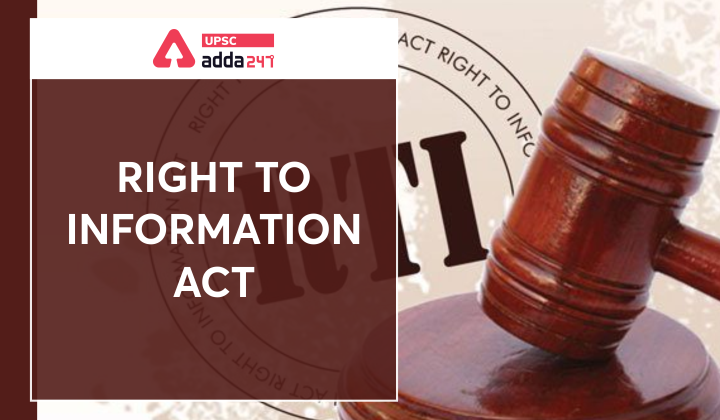Table of Contents
Right to Information Act- Relevance for UPSC Exam
- GS Paper 2: Important aspects of governance– Citizens charters, transparency & accountability and institutional and other measures
Right to Information Act- Background
- Right to Information Act 2005 is parliamentary legislation that sets out the rules and procedures regarding citizens’ right to information.
- ‘Right to Information’ is implicit in the ‘Right to Freedom of Speech and Expression’ under Article 19 of the Indian Constitution.
- The Right to Information Act 2005 was an effort by parliament to consolidate this implicit fundamental right of citizens.
- We have already discussed the key concept of the Right to Information Act, historical background and its objectives. In this article, we will discuss various important features of the RTI Act 2005.
Fill this form to get free Study Material of UPSC ESIC Deputy Director
Right to Information Act- Key Features
- Section 2(h): Defines public authorities. Under it, public authorities mean all authorities and bodies under the union government, state government or local bodies.
- The civil societies that are substantially funded, directly or indirectly, by the public funds also fall within the ambit of RTI.
- Section 4 (1)(b): Government has to maintain and proactively disclose information.
- Section 6: Prescribes a simple procedure for securing information.
- Section 7: Prescribes a time frame for providing information(s) by PIOs.
- Section 8: Only minimum information is exempted from disclosure.
- Section 8 (1): It mentions exemptions against furnishing information under the RTI Act.
- Section 8 (2): It provides for disclosure of information exempted under the Official Secrets Act, 1923 if the larger public interest is served.
- Section 19: It provides for a two-tier mechanism for appeal.
- Section 20: It provides for penalties in case of failure to provide information on time, incorrect, incomplete or misleading or distorted information.
- Section 23: barres Lower courts from entertaining suits or applications.
- However, the writ jurisdiction of the Supreme Court of India and high courts under Articles 32 and 226 of the Constitution remains unaffected.
- Information Commissioners and PIOs: RTI Act provides appointment of Information Commissioners at Central and State levels.
- Public Information Officers: They are government officers who will be responsible for giving information to a person who seeks information under the RTI Act.





 TSPSC Group 1 Question Paper 2024, Downl...
TSPSC Group 1 Question Paper 2024, Downl...
 TSPSC Group 1 Answer key 2024 Out, Downl...
TSPSC Group 1 Answer key 2024 Out, Downl...
 UPSC Prelims 2024 Question Paper, Downlo...
UPSC Prelims 2024 Question Paper, Downlo...





